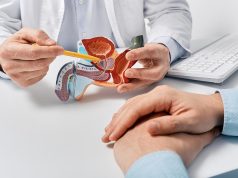Improvement in urinary symptoms with better preservation of ejaculatory function seen with double-n technology
By Elana Gotkine HealthDay Reporter
THURSDAY, Feb. 6, 2025 (HealthDay News) — For men with benign prostatic hyperplasia (BPH), transurethral Holmium Laser of the Prostate (HoLEP) with Double-n Technology shows promise for improving urinary symptoms while better preserving ejaculatory function, according to a study published online Jan. 10 in the World Journal of Urology.
Zhixiang Gao, from Zhangjiagang Hospital Affiliated to Soochow University in Suzhou, China, and colleagues conducted a multicenter, prospective, single-blind, randomized controlled trial involving sexually active men with BPH. Participants were randomly allocated to standard HoLEP, single-n technology, and innovative double-n technology (groups A, B, and C, respectively). A total of 139 participants completed the study.
The researchers found that all groups had significant improvements in maximum urinary flow rate and the International Prostate Symptom Score. Across all groups, there were initial declines in International Index of Erectile Function scores, stabilizing to baseline by three months, with no additional improvement observed. Modest antegrade ejaculation rates were seen in group A, starting at 15.4 percent at three months and reaching 23.1 percent at 12 months. In groups B and C, significant improvement was seen, with antegrade ejaculation rates increasing from 31.8 to 45.5 percent and from 57.8 to 77.8 percent, respectively. Group A had 100 percent semen reduction at three months, decreasing to 77.8 percent at 12 months. A similar trend was seen in Group B (100 and 68.2 percent, respectively), while a more pronounced decline was seen in Group C, from 84.6 to 37.1 percent, respectively.
“The Double-n HoLEP represents a significant step forward in the surgical management of BPH, especially for patients concerned about preserving sexual function postoperatively,” the authors write.
Copyright © 2025 HealthDay. All rights reserved.








